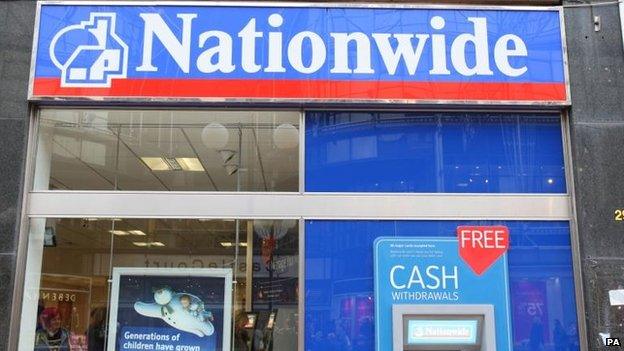Nationwide: 'Don't call us Co-op'
- Published
- comments

If there is a financial institution that feels grumpy at the woes of Co-op Bank, it's Nationwide.
Because the UK's largest building society fears that the near collapse of Co-op Bank has tarnished all financial mutuals - or banks owned by customers (members) rather than by conventional investors.
As it happens, Co-op Bank wasn't a mutual at the time it ran into difficulties: it was (and is) a PLC owned by a mutual, Co-op Group, so its "mutual ethos" was transmitted by the owner.
But that's a nice distinction, which many may not have noticed. Nationwide fears that the debacle at Co-op Bank has somehow created an impression that so-called "good" or more ethical banking is incompetent banking.
So Nationwide is keener than usual that you should notice its latest financial results, published today.
These show that it is increasing its share of mortgage lending and capturing people's savings at a terrific pace.
In the six months to the end of September, its share of all gross mortgage lending was 15.4% - some 50% more than its so called natural market share (based on its existing stock of loans).
As for the increase in its deposit balances, these rose £5.4bn - representing a quarter of all such new saving in the UK.
These growth rates may bring back chilling memories of Northern Rock's dash for expansion shortly before it went pop. But Nationwide insists it is not taking dangerous risks.
On the one hand, its net mortgage lending was almost identical to the increase in its net savings: or to put it another way, it is not dependent for lending growth on unreliable sources of finance, as Northern Rock was.
Also the average ratio of mortgage loans to the value of houses, or LTV, for new mortgages was 69%, and the LTV on its stock of mortgages is 49%: Nationwide is not going bonkers by lending more than homebuyers can afford to repay.
Even so, Nationwide provided mortgages to a remarkable 22% of those less able to provide chunky deposits, first-time buyers, in the period. And some of these were 95% mortgages.
In other words, it is less vulnerable than the other banks to the charge that it is discriminating against those trying to get on to the housing ladder.
And this success in serving first-time buyers probably explains why Nationwide has not found it necessary to sign up to the government's second phase of the Help to Buy mortgage-guarantee scheme.
This implies that the perceived need for Help to Buy is something of an indictment of the competence of the big, conventional banks - a market failure that doesn't apply to a big mutual.
Financial strength
How does all this growth translate into profits?
Well pre-tax profits rose 162% to £270m on a statutory basis; and the increase was 155% to £332m, excluding assorted one-offs and funnies.
As for the all important issue of its ability to withstand shocks, well on the Prudential Regulation Authority's recently reworked definition, its ratio of loss-absorbing, tier 1, core-equity capital to risk-weighted assets (oh yes) rose from 6.8% to 8.1%.
Importantly, that is well clear of the 7% minimum threshold.
But famously, and to the deep chagrin of Nationwide, it and Barclays flunked the PRA's other measure of capital strength, the adjusted "leverage" ratio of equity to gross assets.
But that's being fixed.
In the period this ratio increased from 2% to 2.1% - which the bank's chief executive Graham Beale tells me is an ahead-of-schedule improvement.
He insists that the bank is on course to meet the 3% minimum by the 2015 deadline.
So Nationwide can claim, with credibility, to be a wholly different kettle of mutual-banking fish to the Co-op: fresh and vital, rather than stinky and rotting, perhaps.
But there remains the issue for Nationwide, as for all mutuals, that in a crisis, it can't raise additional capital in a hurry, in the way that banks can, in that it can't tap outside investors for funds.
But, as I've pointed out before, Nationwide has a cunning plan to create a new category of capital - with the unappealing name of Core Capital Deferred Shares - that would allow it and other mutuals to tap investors for something that looks quite a lot like ordinary dividend-paying shares.
Mr Beale tells me that Nationwide has solved all the technical problems with the creation of the newfangled capital. And I wouldn't be surprised if we saw a few hundred million quid's worth of this stuff flogged to the City in the coming weeks and months.
Which would go some way to levelling the playing field between conventional banks and building societies, when it comes to their ability to protect themselves from unexpected nasties.
So to rework the cliche, news of the demise of mutuals - extrapolated from Co-op Bank's conversion into a hedge-fund owned, stock-market listed bank - may be a bit previous.